Arsenal
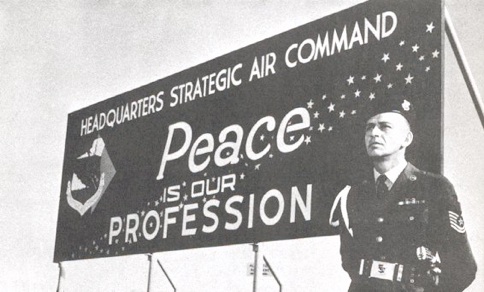
From Homegrown in Florida (University Press of Florida, 2012)
The Cuban Missile Crisis of 1962 was probably the closest the world has ever come to nuclear war. Those who lived on Homestead Air Force Base, the huge installation just north of the Keys, didn’t take the situation lightly. Trust me – I was there. WM
……….
They changed movies at the base theater every other night, so three times a week, after dinner, I’d dig change from my father’s uniform pockets and ride my bike to the seven o’clock show.
Maybe they’d call child-protective services on my parents today for letting an 8-year-old go a quarter mile alone to a movie house and sit in an auditorium of twentysomething airmen in the hormonal agonies of date-groping with wing commander’s secretaries and commissary cashiers. But this was 1962 at Homestead Air Force Base in South Florida and it was a different world. It was safe to be a kid in that world and to be rocked in the unlikely bosom of the military-industrial complex.
Movies cost me 15 cents (adults paid 35) and we got our money’s worth: in addition to the feature, we had newsreels, cartoons and a raft of previews. Then, just before the picture began, everyone in the theater stood for the playing of “The Star-Spangled Banner” as a huge black-and-white flag rippled on the dirty-gray screen. I was a kid, but I felt that we were all in military service, not just our fathers. I didn’t see my first civilian feature until I was 17 and on a date. “What the hell?” I said when the Warner Bros. logo burst onto the screen after a few sets of previews. “When do we stand for the anthem?” My girlfriend rolled her eyes at me like I was insane. It was the first of many shocks from the outside world.
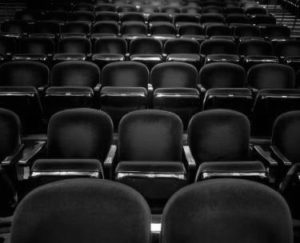
Elvis. Elvis and girls in fringed bikinis. Suzanne Pleshette. Tuesday Weld. Yvette Mimieux – ah, those objects of single-digit lust. Westerns. War movies. Musicals. Beach-blanket entertainment. As an adult I say have “eclectic tastes,” but as this checkered film-viewing childhood shows, that’s just a nice way of saying I’ll watch anything.
We were a David-and-Chet home and I was – compared to my friends, at least – pretty well informed about world affairs. My father discussed his surgeries of the day at the table and so, as the only squeamish one in the family, I tried to steer Dad’s dinnertime performance toward current events.
“Who do you think’s our biggest enemy, Dad? Russians or Chinese?”
“Hard to say, son.”
“The Russians scare me most.”
“Why’s that?” He popped a Brussels sprout into his mouth and chewed, looking at me quizzically.
I thought for a moment. “They’re more … ominous.”
My brother barked out a laugh. “Did you hear that? Buttsmell said ‘ominous.’”
“Chuck,” my mother scolded, jabbing the air in his direction with a mashed-potato-laden fork. “Do not call him Buttsmell at the dinner table.” Short pause. “Or anywhere else.”
“Well,” Dad said, basso profundo, looking over his glasses. “They are a powerful nation, there’s no doubt about that. But they are inferior to us technologically. We’re the strongest nation on earth, son. You don’t have to be scared.” He smiled, and then turned to my older brother. Chuck wanted to be a doctor. “What was I saying?” That day’s hemorrhoidectomy was back on the table.
I learned to eat quickly, so I could hop on my bike and retreat to my darkened sanctuary – my solitude in the front row, among the horny multitudes.
Tuesday night was the equivalent of art-house night. Movies played Sunday-Monday, Wednesday-Thursday and Friday-Saturday. Tuesday was odd night out, the night for imports – Italian movies with big-bosomed women and subtitles, English films with jokes that weren’t funny, South American documentaries showing people eating bugs that were still alive.
There it was, black and white: That bald man, pounding his shoe on the table and screaming into a microphone. The subtitle translated his rant: “We will bury you.”
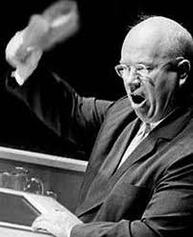
“Khrushchev scares me,” I said at dinner the next night when there was a pause in Dad’s account of an emergency gall bladder.
“Actually, son, he’s much more of a … moderate, I guess we could say … than Stalin. You’re lucky you don’t remember Stalin. You would have never slept through the night.”
“But in the movie last night,” I stammered, “they showed him pounding his shoe on the desk. He took it off and started slamming it on the desk and the words said were, ‘We – will – bury – you.’”
Dad shrugged, eyes expectant, morsel of impaled roast suspended in mid-air, waiting for the punch line.
“Well … what does he mean?”
“He’s going to bury you, Buttsmell,” my brother interjected fervently. “Toss you in a grave and cover you with dirt, until you suffo—“
“Chuck, will you stop it?” Sister Suzanne to my defense. “Quit tormenting him.”
“And that name, Chuck – for God’s sake.” Mom put down her silverware and covered her eyes.
“Your brother’s only teasing you, Bud,” Dad said. “It all goes back to technology. Khrushchev is saying his technology – Russian technology – and, therefore their culture will bury ours … last longer, become the dominant world culture. But not bury us – lit-rally.”
A smile – one of those don’t-worry-you’re-not-going-to-die smiles.
“But remember: that’s not true. We’re the greatest, most powerful nation on earth.” My face showed doubt. “Hey,” Dad said, brightening. “Want me to take you down to the flight line again?”
“Can we all go?” Chuck asked.
“Sure.”
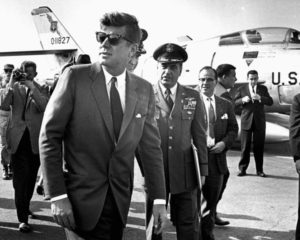
And so after dinner we piled into Dad’s candy-apple red Cadillac convertible and drove over to the wing command. Dad was hospital commander but his best friend, Colonel Mason Dula, was wing commander and so we had visitation privileges.
There they were, parked on the palm-lined taxiway to the runway – B 52’s and F-104’s, lined up, their steel bodies polished and shining in the last rays of the sun. Rarely has a display of military might looked so … pretty.
We’d been stationed in New Mexico and England and Germany and Nebraska. The housing was terrible. We had to shake scorpions out of our shoes in New Mexico. In Nebraska, the windows on our duplex were so loosely plumbed that the weekly DDT spraying seeped into the kitchen. And in England, we lived in three Quonset huts connected by a plywood hallway. The walls and ceiling of that hallway didn’t meet and we could see the stars through the roof. Our time in Britain was a haze of Vapo-Rub and Kleenex tissues.
So when we arrived at Homestead Air Force Base south of Miami in 1962, we thought we had lucked into the best posting in the military. Our three-bedroom, two-bath stucco home was just across the street from the Officers’ Club and my father, for the first time, was hospital commander.
It also felt safe. I took comfort in the polished-steel display of strength on the flight line. I was protected by this arsenal of American might on the southernmost military outpost on the mainland. There was a naval base in Key West, but that didn’t count. We were the big dog of military muscle. Watching the pilots as they strode, laughing, toward their planes, helmets tucked jauntily under their arms, I felt invulnerable.
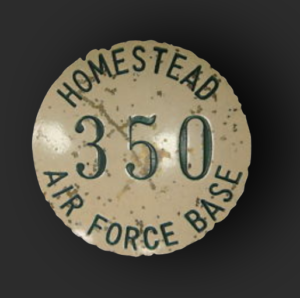 Living across the street from the Officers’ Club meant bounty for my brother and me. There were frequent parties on the club’s patio facing our house and we could hear the laughter and the primitive, drunken piano playing even in the sanctity of our living room. We had prime quarters. My parents could meet their friends for drinks and never be out of sight of the three children. Not that we needed watching. My brother was 16 and felt he was self-sufficient, ready to go out on his own. But he was not above sneaking out of the house with me at dawn to go pick through leftovers on the patio’s banquet tables: sweating cubes of cheese, crumbled cake with artery-clogging fluorescent icing and brightly colored drinks in umbrella-littered cocktail glasses.
Living across the street from the Officers’ Club meant bounty for my brother and me. There were frequent parties on the club’s patio facing our house and we could hear the laughter and the primitive, drunken piano playing even in the sanctity of our living room. We had prime quarters. My parents could meet their friends for drinks and never be out of sight of the three children. Not that we needed watching. My brother was 16 and felt he was self-sufficient, ready to go out on his own. But he was not above sneaking out of the house with me at dawn to go pick through leftovers on the patio’s banquet tables: sweating cubes of cheese, crumbled cake with artery-clogging fluorescent icing and brightly colored drinks in umbrella-littered cocktail glasses.
There was something different about the texture of the sound this Sunday night, as our parents were across the street in the noisy throng. Chuck and I anticipated the morning’s before-school feast on the Officers’ Club lawn. As my brother did his homework, and my sister tied up the telephone, I watched television and the living room with the party roar from across the street as background noise. Around 11, when I should’ve been in bed, I heard my parents talking as they crossed the lawn. They opened the door before I had a chance to get back to my room and pretend to be asleep.
“Charles, something must be going on,” my mother said. “they’re not supposed to dress that way in the Officers’ Club.”
“I think Mason knows something, but he’s not telling,” Dad said. “Maybe he just didn’t want to talk about it at the club. I’ll let you know what he says tomorrow.”
“Not that I mind the flight suits,” my mother said, “but they’ve been so rigorous about kicking out flyboys before. So it was strange, no one raised a fuss when they all came in wearing flight suits, and you in your dress uniform.”
“I’ll see what I can find out tomorrow,” Dad said.
Obviously, too busy to notice me.
Chuck was an early riser. He and Suzanne had to catch a bus to Redlands Junior High, out in the civilian world. I had only a short bike ride to Air Base Elementary, so I usually got an extra hour of sleep each morning. But on those post-party mornings I was always the first one up and needed to rouse my brother. We were sneaking out the front door when we were greeted by the spectacle of my father and his parachute-silk boxer shorts standing in the driveway smoking a cigarette and holding a still- rolled up Miami Herald. He was too distracted to notice us. Across the street we saw a line of barbed wire, and behind that, on the Officers’ Club lawn, a tank. We lived on an Air Force base, but the troops that milled around behind the wire were wearing the telltale olive drab of the United States Army. I had awoken inside my nightmares.
“Dad,” I said. “What’s happening?”
“Your guess is as good as mine,” he said. “When I came out to get the paper 10 minutes ago they were still stringing the barbed wire. The tank just rolled up since I’ve been standing here.”
“It’s war, Buttsmell,” Chuck said. “And Ol’ Nicky Kruschev knows where you live.” But there was a discernible tremor in his voice, not the usual big-brother taunt.
I watched the soldiers as they moved with a purpose on the Officers’ Club lawn. I’d seen drills before; I’d seen alerts. But I hadn’t seen this.
My father never betrayed any anxiety or fear. But this morning, I could sense he was on edge. “Let’s go inside and see if there’s anything on the news.” He put his arm on my shoulder and steered me inside.
My mother and sister were already standing in front of the television. My mother’s eyes told me she was frightened. “This explains the flight suits, Charles.” She turned to my father. “I wonder how long this has been going on.”
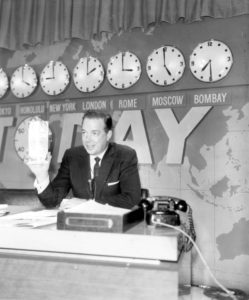
I looked to Dad, standing calmly in parachute shorts, watching the news with one hand on his hip, the other still holding the newspaper and cigarette, secure in his ability to tune out distraction. I followed his eyes to Hugh Downs on the television.
This phrase made my heart shudder: “brink of war” as in we’re on the . . . .
The map behind Hugh showed Cuba and there were what looked like felt destroyer-shaped cut outs in the gray mass representing the Atlantic Ocean. It looked like a bulletin board display that Mrs. Hood would concoct.
Yet, there it was on “The Today Show.” Hugh said some newspapers that morning reported that there were nuclear missiles on those felt ships.
And there, prominent in the upper-left hand corner of this display, was us. South Florida. The southernmost military installation on the American mainland.
“Guess who’s sending those missiles down here, Buttsmell?” Chuck said, not leaving time for me to answer. “Your buddy Nicky, man of your nightmares.”
“Chuck!” My mother again. “You’re scaring him.”
“Why do you always have to be such a spazz?” Suzanne asked.
So there I was: Eight years old, and my life was ending. Why was my father in the military? Why did he bring us in harm’s way? Why couldn’t we be stationed in Greenland, where no one would care about us? When those missiles made it to Cuba they would be pointed at us.
Dad sensed my fear. “Don’t worry, son,” Dad said. “We’ll be all right.”
But I had my doubts.
At school, the teachers were grim-faced. Mr. Solomon, the principal, came on the squawk box and in his slow, calm voice, asked us to pray for our fathers and for the president. (We could still pray then. It didn’t become illegal until the next year.) On the playground, Paul Franks and Alan Rinehart, my buddies, joined in the general elementary school exhibitions of testosterone (“I say we send in some B-52s down low over the mountains and blast those damn Cubans back to Spain.”) but I echoed the sentiments out of peer pressure, nothing more. They were pilots’ sons and I figured maybe it was different growing up with a fighter jock for a dad.
That night, President Kennedy spoke to the nation. Yes, he said, this had been going on for a couple of weeks. Yes, there were missiles in place in Cuba. Yes, we might very well be on the brink of war. If a couple of newspapers hadn’t gotten the story, I wondered if he would be making that speech if it hadn’t leaked out. We’d always mocked the president’s strange accent and how he pronounced the country as Cuber – but we couldn’t even muster a Hahvahd-accent joke.
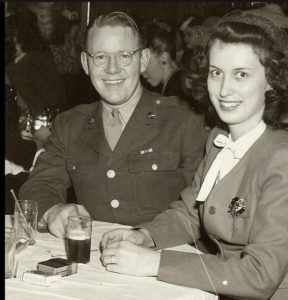
When the president finished, the network resumed its usual programming – that night it was an episode of the new show “It’s a Man’s World,” with Glen Corbett and three other guys living on a houseboat on the Ohio River. How dare they? We’re on the brink of war and the network feeds America fluff? Didn’t anyone care about us – the people living on that fragile finger of land that jutted so vulnerably into the Caribbean Sea? If I’m about to die, I don’t want the rest of America laughing at some houseboat hijinks on some goddam TV show.
They canceled the movies that week and instituted a curfew: 7 p.m. No after-dinner bike ride, no tetherball with Ricky Wilson, no visits to the flightline. My whole world was on lockdown, by order of the base commander, who got his orders from the joint chiefs, who got their orders from JFK himself.
There was nothing more frightening than walking into the living room and seeing “NBC News Bulletin” on the television screen. I was coming in from doing homework in my room when “The Virginian” was interrupted by Chet Huntley’s voice: . . . “We interrupt our programming to bring you a special news bulletin.”
I must have gasped. My brother turned and seized the moment: “OK, Buttsmell, old Uncle Chet is here to tell you to kiss your ass goodbye.”
Turns out it was a new but not life threatening development. We merely remained on the brink of war, not the brink of vaporization.
After we listened to the news, my sister went out on a date, my dad turned off the television and put on an opera, my mother retired to the bedroom and read a Philip Wylie novel and my brother again engrossed himself in the works of Spinoza. Everyone else went on with their lives but me. I was left to bargain with the holy spirit for my life. I was old enough to know what nuclear war meant. I’d lived with the fear of instant annihilation as long as I could remember. It was the way of life and for any kid who grew up in the military in the nineteen fifties and nineteen sixties. Death was all around us. We were constantly reminded that when war came our families who would feel it first.
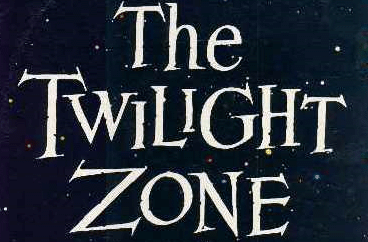
I’d spent much of my childhood frightened, but a lot of that fear was self-inflicted. I was in love with being scared. When we were still stationed in Nebraska, I used to stay up late Fridays to watch “The Twilight Zone” and afterward run down the street barefoot with the nightly televised monster on my childhood heels. But during that Florida fall, the fall of the missile crisis, “The Twilight Zone” was missing in action from the CBS schedule. CBS ran “Rawhide” and “”Route 66” on Fridays, so I wasn’t without some good shows to watch. But now there was something in my life that scared me even more than the aliens on my favorite television show. Before those missiles were pointed our direction, my greatest fear had been turning into dust just like Kevin McCarthy in the “Long Live Walter Jameson” episode. “The Twilight Zone” cost me a lot of tossing and turning in my childhood. I remember one Friday night when the fear of death was so strong that I got out of bed a half dozen times and went in my parents’ room to kiss them good night as if I was leaving them forever – which I fully expected to do before morning. But the next morning came and I was alive, and spent the daylight hours preoccupied with baseball, my new skateboard or the strange assortment of dead critters and castoff merchandise my friends and I found floating in the canals that cut through the base. Even though the seven-game 1962 World Series had ended just the week before with another world championship for the New York Yankees (yawn), thoughts of Ralph Terry’s mound heroics (filling the void caused by the dual slumps of Mantle and Maris) could not get the missile crisis out of my head.
I’d been living with the real possibility of instant nuclear annihilation for a week when a new crisis suddenly loomed on the horizon: Halloween.
We’d awakened to the barbed wire on Monday and by Friday we were still – to my surprise at least – relatively solid masses of protoplasm. I suddenly realized Halloween was the following Wednesday. This was the social event of the kid season, but I couldn’t get excited about being scared because of the real fear across the street from our house. And besides – what was my costume this year?
On Saturday, my mother greeted me at the breakfast table with a grim face. She was folding shirts still warm from the dryer.
“I’ve put together a bag for you – just in case,” she said. “A few changes of clothes. You might want to put in some books or something.”
I still had sleep in my eyes; I didn’t understand. “A bag? Why?” What I wanted to say: If we’re vaporized, we can’t take our luggage with us. I looked around – Suzanne was the only one home and I remembered that while coming down the hall, I’d seen a suitcase on her bed. Chuck and Dad were gone – probably at the hospital. Dad sometimes took Chuck on rounds on the weekends.
“They may” . . . she hesitated here . . . “evacuate us.” She stopped folding.
“They want us all to be safe. Your father . . . your father will have to stay here, to run the hospital. They brought in 150 new beds over night.”
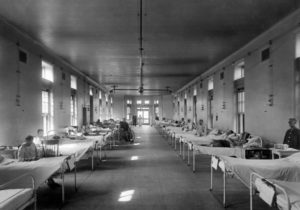 I was still back on the evacuate word. “Where are they sending us?”
I was still back on the evacuate word. “Where are they sending us?”
“Maybe nowhere,” she said. “We don’t know yet. But we have to be ready. Remember, in the Air Force, you never know what will happen.”
That part was true. I remembered when we lived in Germany, we were sitting down for Thanksgiving dinner when my father got a call and almost immediately a young airman was at the door with a blue military car and Dad was flown off to Libya to do surgery at the air base in Tripoli. My father’s hands were much in demand. It made it hard to have holidays or take vacations and now we might be leaving, but he would have to stay behind – to run the hospital, she said, but I knew what that meant: to handle all of the casualties, if he was still alive and able to work.
I felt them coming, but turned and went down the hall before my mother could see my tears. “OK, Mom. I’ll pack a couple of books.” I never understood that term “military brat.” I thought we were a pretty good bunch of kids and we sure as hell learned to roll with the punches.
That was the worst day. We all sat at home in front of the television: weird for a Saturday. Usually, after rounds, all my dad wanted to do was to haul ass down to Long Key for prime fishing. But we gathered in the living room, awaiting the phone and the order to evacuate. The TV kept us up on the events and when they reported that the Cubans had shot down a U-2, I figured it was a matter of seconds before Krushchev pressed the button (probably with that goddam shoe of his).
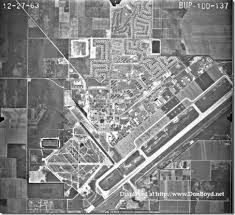
But the button wasn’t pressed and my father – a man not promiscuous with hugs – gave me a year’s worth in that afternoon, sitting next to me on the sofa as we all watched the news. Whenever my brother started up with his pimpled alienated so-superior teen-age yammering it was my father – not my mother or sister this time – who came to my defense and shut him down. Eventually, the weight of that day’s fear wore me down and I shuffled to bed and made it through another night, awakening, again alive – not vaporized or even turned into dust under the bed.
Suddenly, Halloween was upon us. I had no costume and it was not my style to go for the irritating plastic mask of a Ben Cooper store-bought costume. We all took great pride in our Halloween. My friend Kent McCord had been working on his costume since the beginning of school. He was going to be a bat and it required him to wear a leotard, which was pretty embarrassing. But Mrs. McCord had made a frame Kent wore on his back that, when covered with black polyester, gave him a four-foot wingspan. He had a cap with cardboard-reinforced ears that stuck up four inches from his skull – truly an outfit that would have made Bruce Wayne purple with envy.
There was no doubt that Kent’s costume would be the best costume of the year. But still, there were other notable efforts: the usual miscellany of cowboys, fighter pilots and – on special, this year only – several miniature Fidel Castros eager to show up at your door and trick you out of some treats. Paul Franks said he was going the Cuban dictator route and told me at lunch the day before Halloween that he planned to construct his beard from Brillo pads taped to his face.
At least he had a costume. I’d been so worried about nuclear annihilation that I hadn’t given one thought to the holiday or its required apparel. I figured I wouldn’t live that long. But the morning of Halloween, a smack-dab-in-the-middle-of-the-week Wednesday, I still had no costume.
Dad, in a uniform starched as stiff as our cement driveway, sat at the breakfast table sipping his coffee and studying the Miami Herald
“Dad,” I said. “Tonight’s Halloween, and I don’t even have a costume.”
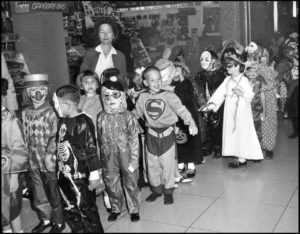 He looked up at me slowly. “You need to put more effort into planning.” He set the newspaper aside. “What were you last year?”
He looked up at me slowly. “You need to put more effort into planning.” He set the newspaper aside. “What were you last year?”
We lived in Nebraska the year before. “A cowboy, remember? Gil Favor from ‘Rawhide’?”
“Oh, yes, yes,” he muttered, suddenly lost in thought. “Most of the kids wanted to be Rowdy Yates, but you were Gil Favor. Interesting choice.”
“And the year before that, I was a clown. I’m not worried about what I was, Dad, What am I going to be now?”
“Don’t worry, Bud,” he said. It was the same voice he used when he talked to me about nuclear war. “I’ll think about it at work today and we’ll come up with something.”
Chuck had come into the kitchen and was pouring a cup of coffee. He was only 16 but he said he actually liked the taste of it. “What does it matter, Buttsmell? With the curfew, you can only trick or treat for 15 minutes. No one’s going to be able to see you at all. So what’s the point? You’re better off staying at home and pigging out on mom’s candy.”
True: The base commander had decreed that trick or treating would take place between 7 and 7:15 that evening. No exceptions. Parents would be held responsible for the delinquencies of their children.
“So I take it you’re not going out?” Dad turned to Chuck, arching his eyebrows.
“It’s kid stuff, Dad. I think I’m a little old for Halloween.”
Chuck’s loss. But at the moment, I was still concerned with logistics: “Dad, do you think they’ll really have that curfew tonight? I mean, it’s Halloween. And we’re not on the brink of war anymore are we? So what does it matter? What does it matter if we trick or treat for two hours? Finishing in 15 minutes won’t save our lives. After all, if there was a nuclear attack I think we’re in trouble with them inside or outside. If I have to go, I want to go with a bag full of candy.”
He smiled and put his hand on my shoulder. It was the first time I’d made a joke in a long time. “Don’t worry, Bud. I’ll think of something.”
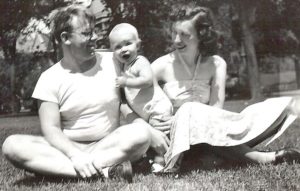
At school, the anxieties of the week before about instant annihilation were replaced to our concerns over proper trick or treating in only fifteen minutes. But at least my classmates had costumes. Being so certain I was going to die, I hadn’t given a Halloween costume much thought. I had faith in my father, but still he was an old guy in his forties who did not understand the modern complexities of Halloween: when he was a kid, back in the Depression, they probably had lower standards for costumes. My mother wasn’t much help either, because she didn’t take Halloween seriously. Her standing joke every year when I asked what I should be was the same: get naked, stick a raisin in my belly button, and go as a cookie.
Still, Dad always had a sense of fun. Once, when we lived in Germany, he’d been away for a few days – I think they flew him to Madrid to do surgery. He got back at three in the morning and since he’d brought us a toy, he wanted to play with it right then. It was a Masonite clown head with a hole in the mouth and the object was to toss beanbags through the opening. He was so excited, he woke us all and took us into the hall and we had a contest. I’d never been awake at three in the morning before; turns out, it was fun.
Dad was also the first one up on Christmas too. He’d yell, “Ho, ho, ho” and slam the door loud enough to wake us. Usually, this summons came at 5 a.m., because Dad couldn’t wait for us to see his presents. By the time my friends – normal people – were waking up and opening their presents at 7 or 8 on Christmas morning, we’d finished our first round of playing and were back in bed, fast asleep.
Dad worked late that Halloween, and when he finally came through the front door, I had only a half hour before the designated trick or treating time. He was carrying a grocery bag from the commissary. He set it on the table, pulled a white coat from the bag and turned to the refrigerator.
Inside the bag was a stethoscope, a mirrored headset and a small rubber hammer used to test reflexes. My doubt made my voice catch: “Is this my costume?”
“Yes,” he said. “Let me help you.”
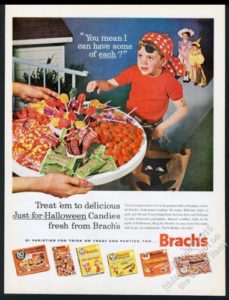 He dressed me in his white coat, pinning it up so it would fit. He tightened the headset to accommodate my eight-year-old head, then positioned the mirror over my forehead. He pulled a label-maker from the bag and covered his name on the doctor’s name badge with “Dr. Killem.” For good measure, he splashed the white coat, and my face, with ketchup.
He dressed me in his white coat, pinning it up so it would fit. He tightened the headset to accommodate my eight-year-old head, then positioned the mirror over my forehead. He pulled a label-maker from the bag and covered his name on the doctor’s name badge with “Dr. Killem.” For good measure, he splashed the white coat, and my face, with ketchup.
“Are you sure this is a good idea?” I asked him when I looked in the hallway mirror.
“You look great.”
“Yeah, but . . . .” This was tough to say. “All the neighbors know me and they know I’m your son. If they see me with all of this – “ I held out my hands to reveal my ketchup-splattered white coat “—and they see this name, they might think, or get the impress– . . . they might think you’re a bad doctor or something.”
Dad kneeled down. He smiled, running his hand over my head. “They know better, son.” He stood. “You look great,” he said. “Time’s wasting. Go out there and knock ‘em dead.”
“Let me see,” Mom said. Everyone came into the hallway for the full-family inspection. Even my brother had to confess that I looked pretty good. “Not bad, Buttsmell, not bad.”
Dad put his arm on Chuck’s shoulder. “I can whip up something for you,” he said. “You want to go along, make sure he doesn’t get into trouble?”
Chuck snorted. “How much trouble can he get into in 15 minutes?” He considered, for a moment, the thought of trick-or-treating. “I wonder,” he said finally. “How would I dress if I wanted to go as Nietzsche?”
It was, in its sugar-crazed way, a horrifying scene – kids ran between houses in the early-evening orange of sunset. There was no time to hook up with your buddies for a leisurely sugar-crazed haul. Most of my friends were sons of enlisted men and just getting to their houses would use up my 15-minute allotment. So I worked solo, running between houses, breathlessly shouting “trick or treat” as I ran up to the doors, shaking my candy bag impatiently if there was any delay in coughing up the goods.
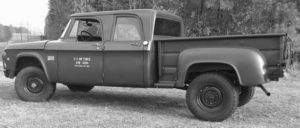 After 15 minutes, the air patrol’s blue trucks – the ones with the bullhorns on top – began driving through the residential streets: “The Halloween period is over . . . all children must return to their homes. Curfew is in effect.”
After 15 minutes, the air patrol’s blue trucks – the ones with the bullhorns on top – began driving through the residential streets: “The Halloween period is over . . . all children must return to their homes. Curfew is in effect.”
I’d done pretty well under the circumstances. I looked into the wadded-up now-nearly-translucent grocery sack and saw Milk Duds, Clark bars, Three Musketeers and other riches. Colonel Callahan had thrown in some of those foul candy corns, but other than that, it was a good haul.
I ate a few handfuls and undressed in my room. Chuck was reading in the living room, Mom and Suzanne were watching television. Dad came to the door.
“So you did all right, huh?”
“Yep. Thanks, Dad. It was a good costume. Colonel Dula laughed and made Mrs. Dula take a picture. It slowed me down some, but since it was the Dulas, I didn’t mind.”
 “Good.” He stood for a moment, looking at me. My bedtime came before Chuck’s and I was used to going to bed with the light on.
“Good.” He stood for a moment, looking at me. My bedtime came before Chuck’s and I was used to going to bed with the light on.
“See,” Dad finally said. “I told you everything would be all right.”
“Yeah, thanks for coming thr–” Then I realized he wasn’t talking about Halloween. “Oh, that. Yes, we made it.”
He smiled. “This is a funny life we have,” he finally said. “And you know, I’d never let anything happen to you.”
“Yeah, Dad, I know.”
He stood there a moment, not saying anything, just smiling.
I was in a home on the southernmost military outpost on the mainland, protected by an arsenal of American might, rocked in the bosom of the military-industrial complex. Lying there, watching my father smile reassuringly from my bedroom doorway, I felt invulnerable.
